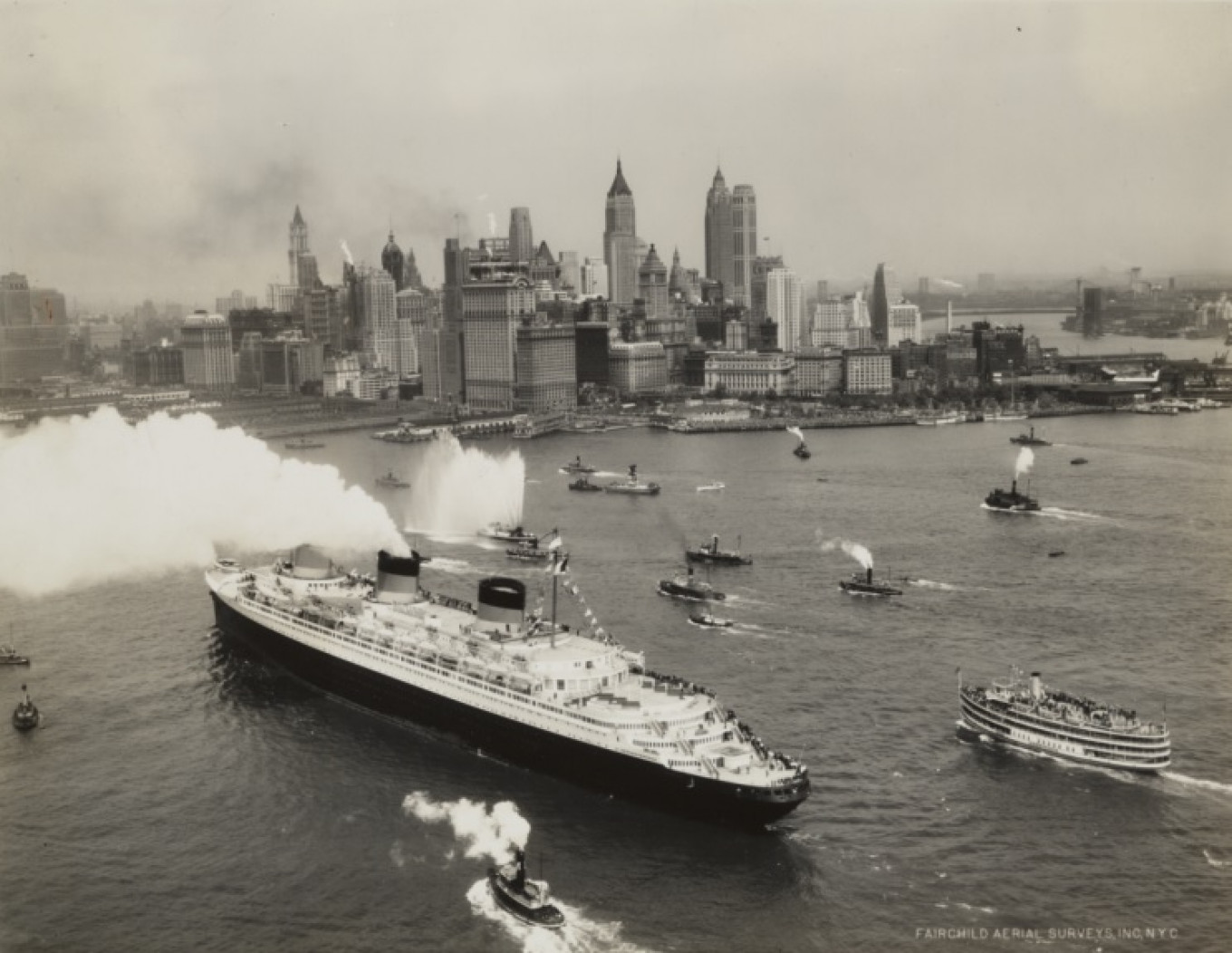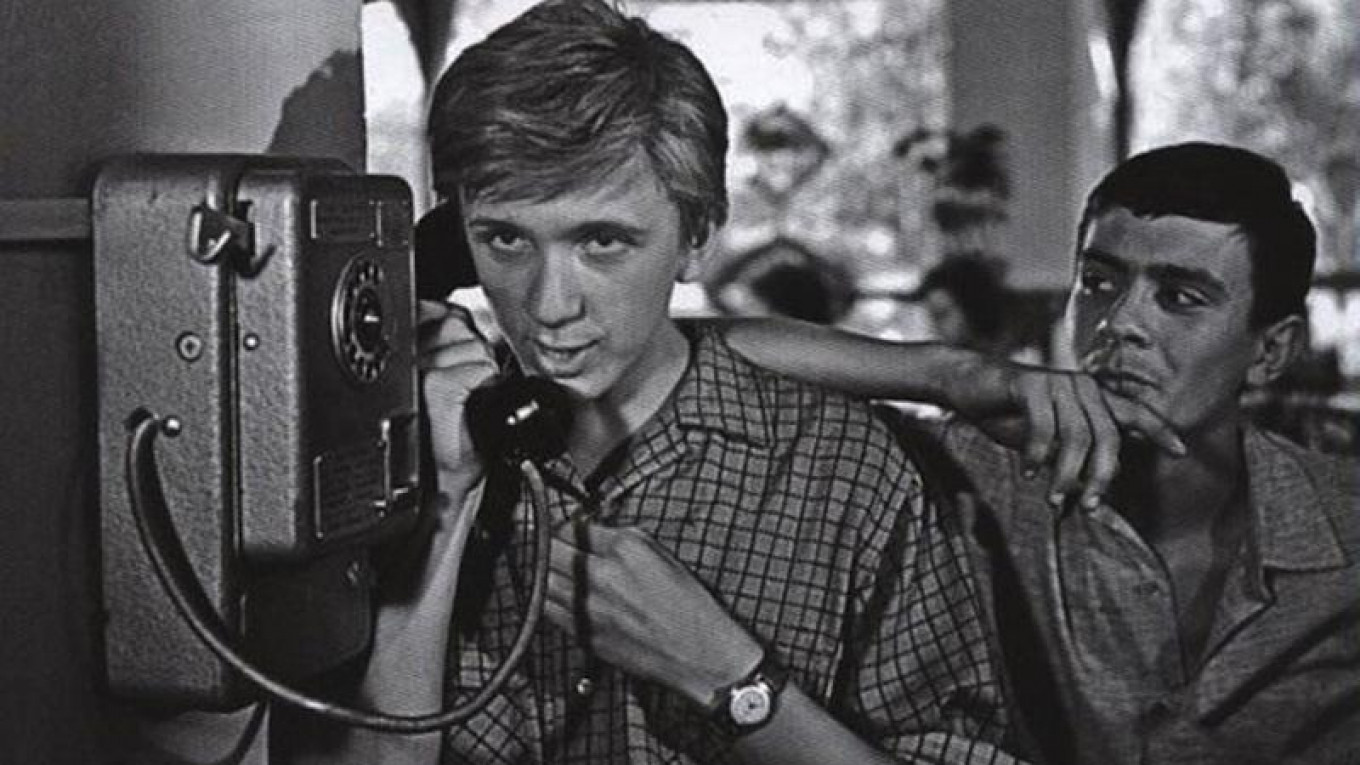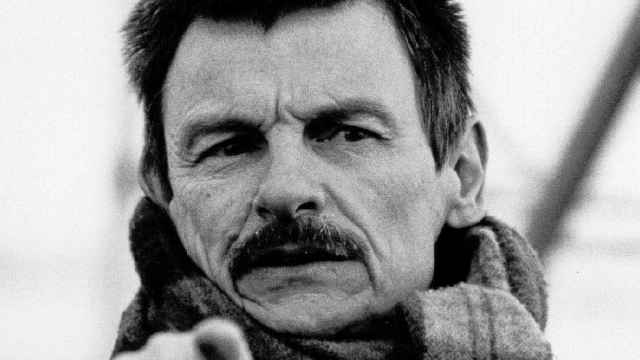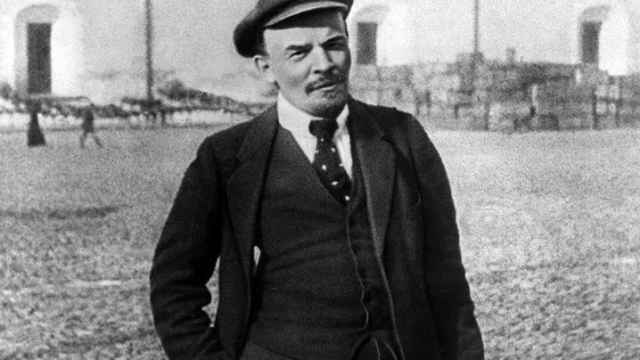It’s May Day Week on Moscow television, as the small screen gets the holiday fortnight in gear with a selection of documentaries and feature films good enough to make you ponder re-scheduling the annual picnic with the in-laws. Here’s the where and when:
MONDAY gets the May Day holiday off to a genial start with Sergei Strakhov’s diverting documentary “The Country of Danelia” (2004), in which legendary film director Georgy Danelia (b. 1930) gives an engaging account of his life in Soviet and post-Soviet cinema. This good behind-the-scenes look at a national classic and how he got that way is followed immediately by a screening of one of Danelia’s best early works, the buoyant “Walking the Streets of Moscow” (1963).
“Walking” is an episodic, rambling-around-the-Big Onion movie-picaresque about four Russian teens at the height of the Thaw era. Led by a debuting Nikita Mikhalkov, these are kids whose self-evident decency and universal problems-of-youth come across as both believable and amusing — a rare combination indeed for Soviet youth films.
The foursome and a fine ensemble of adult supporters weave their way through the city via Gennady Shpalikov’s witty script, convincingly demonstrating en route that the phrase “Soviet lyrical comedy” was by no means an oxymoron. This huge trans-USSR hit also won awards at Cannes, Milan and Prague — and deserved them, as you’ll see. And just try not singing the movie’s eponymous theme song afterwards!
The Country of Danelia / Страна Данелия. Kultura, Monday at 7:05 p.m. and Thursday at 12:30 p.m.
Walking the Streets of Moscow / Я шагаю по Москве. Kultura, Monday at 7:55 p.m. and Thursday at 11:15 a.m.
TUESDAY gives viewers get a good introduction to yet another famous compatriot most have never heard of in a new documentary from the Kultura channel’s “Declassified History” series: “The Russian 'Normandie'” (2017).
Vladimir Ivanovich Yourkevitch (Юркевич;1885-1964) was a native Muscovite who was trained in Petersburg as a naval engineer, sided with the Whites in 1917 and left Soviet Russia to become the world-renowned (or Western-renowned) developer of the modern ship hull and designer of France’s ocean liner of the century, the SS Normandie.
The latter was an enormous undertaking with an enormous result: Three years in construction, the finished liner used 160,000 h.p. engines to transport 2,000 passengers and a crew of 1,300 across the Atlantic in style – and both faster and more efficiently than its sole rival, the Queen Mary.
The Soviet public knew of the Normandie – it was featured in Ilf and Petrov’s famous travelogue “One-Storied America” (Одноэтажная Америка, 1937) after it carried the popular satirists to and from the United States in 1935-36 – but the Russian émigré who built the ship perforce remained unknown in his homeland.
Yourkevitch subsequently emigrated from France to America, joining aviation pioneer Igor Sikorsky and “father of television” Vladimir Zvorykin as Russian master inventors who became United States nationals. Tune in, be impressed and be glad both nations can now boast of the same shipbuilding genius.
Declasssified History: The Russian ''Normandie'' / Рассекреченная история. "Русская "Нормандия". Kultura, Tuesday at 6:45 p.m.

WEDNESDAY. And speaking of Ilf and Petrov, recall that the cast of their second great satirical novel, “The Little Golden Calf” (Золотой теленок, 1931), featured one Heinrich-Maria Zauze, a comically frustrated German specialist working on contract in the USSR. Well, today the same “Declassified History” series shows us just how many real Zauzes were underfoot during the first Five Year Plan – and what became of them afterwards – in the new documentary “Industrialization: A Translation from the German” (2017). It’s a fascinating story – and a cautionary tale worth heeding.
By September of 1932 some 37,500 foreign specialists, laborers and their dependents were on the ground in the USSR, a contingent whose still-extant heritage includes “several Moscow apartment buildings specially constructed at the beginning of the 1930s for workers from Germany.”
Many of the latter were “romantics who came to build socialism,” and as special guests were treated well by their hosts – as long as politics permitted: “They were honored shock-workers and Stakhanovite heroes until 1938, when they turned into foreign spies and enemies of the people.”
Tune in and see their story through rare film footage of the time and archival materials left by German machinist Ewald Ripperger (1902-1938). Then ponder anew what it means when a society suddenly starts loudly and publicly denouncing newly-discovered “enemies,” foreign and domestic.
Declassified History. “Industrialization: A Translation from the German” / Рассекреченная история. "Индустриализация. Перевод с немецкого”. Kultura, Wednesday at 6:45 p.m.
THURSDAY. While we note every May how thin on the ground Russia’s World War II veterans have become, we should also remember that the same fate, inevitably, is now approaching the veterans of Russia’s great post-war cultural breakthrough – and thus offer major kudos to Alexei Vasilyev for his new documentary “The Thaw” (2017), which records prominent figures from this “strange time of intoxicating freshness” as they recall the extraordinary and liberating era of 1956-1968 in their own words.
The cultural contributors recorded here include directors Marlen Khutsiev (now 91), Andrei Konchalovsky (79) and Galina Volchek (83); artist Oskar Rabin (94); designer Fyodor Lvovsky (77); and literary critic Marietta Chudakova (83). These esteemed Thaw veterans are contrasted with representatives of the younger arts generation who spent several years putting together an exhibition on the era for the Tretyakov Gallery (“The Thaw: Facing the Future,” 2017).
This is the kind of television that gives culture (and Kultura) a good name. Tune in and be reminded of how important this brief but shining Soviet cultural interlude was – and consider how fortunate the next Russian arts Renaissance will be to have its heritage to draw on.
The Thaw / Оттепель. Kultura, Thursday at 10:45 p.m.
On FRIDAY, Kultura’s “Masterpieces of Early Cinema” series returns us to the early days of spy mania with Alexander Macheret’s “Engineer Kochin’s Error” (1939), a diverting piece of cinematic high-Stalinism that the great Mikhail Romm dubbed “the first Soviet detective movie.”
While “Kochin” will never be confused with such Western contemporaries as “The 39 Steps” and “Sabotage” – which were far higher on detecting and far lower on didacticism – this story of an airplane designer who naively and possibly treacherously takes some drafts out of the office to work on at home is a good watch for three reasons:
(1) the script was co-written by Macheret and the celebrated novelist Yury Olesha (”Envy,” 1927) who steered clear of the literary limelight throughout most of the Stalin era;
(2) the female lead is played by Liubov Orlova, the “Soviet Marilyn Monroe” (or Marlene Dietrich) who was always luminous and fun to watch – and here all the more so in a rare “negative” role: a simple Soviet girl duped by foreigners into treason, she has the good Soviet sense to accept the ultimate consequences of her crime (“Я изменила не вам, а своей стране, и пусть она покарает меня!”); and
(3) lessons for today abound: As a recent KinoPoisk critic noted, “You get the impression that this society of communism-builders is surrounded by enemies who are trying to compromise and destroy the Soviet Union – but their efforts just aren’t working” – exactly the same house-brand xenophobia that the Putin 3.0 media have been trying to sell us 24/7 for going on three years now.
All right then, tune in for some entertaining and instructive anti-nostalgia in this Stalinesque song your grandmother should know – and then decide for yourself just how much we’ve learned about “foreign agents” and “fifth columnists” over the last 75 years.
Masterpieces of Early Cinema: “Engineer Kochin’s Error” / Шедевры старого кино. "Ошибка инженера Кочина". Kultura, Friday at 10:20 a.m.
Mark H. Teeter is the editor of Moscow TV Tonite on Facebook.
A Message from The Moscow Times:
Dear readers,
We are facing unprecedented challenges. Russia's Prosecutor General's Office has designated The Moscow Times as an "undesirable" organization, criminalizing our work and putting our staff at risk of prosecution. This follows our earlier unjust labeling as a "foreign agent."
These actions are direct attempts to silence independent journalism in Russia. The authorities claim our work "discredits the decisions of the Russian leadership." We see things differently: we strive to provide accurate, unbiased reporting on Russia.
We, the journalists of The Moscow Times, refuse to be silenced. But to continue our work, we need your help.
Your support, no matter how small, makes a world of difference. If you can, please support us monthly starting from just $2. It's quick to set up, and every contribution makes a significant impact.
By supporting The Moscow Times, you're defending open, independent journalism in the face of repression. Thank you for standing with us.
Remind me later.







